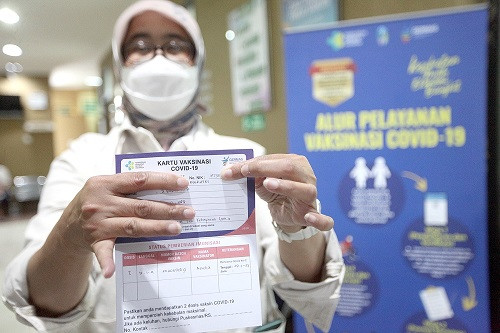Popular Reads
Top Results
Can't find what you're looking for?
View all search resultsPopular Reads
Top Results
Can't find what you're looking for?
View all search resultsData matters
Change text size
Gift Premium Articles
to Anyone
T
he country’s ambition to reach herd immunity against COVID-19 is actually at risk; probably not because of lack of vaccine supplies or health workers administering the vaccination, but first and foremost, due to data inaccuracy.
In fact, in many previous government programs, unreliable data has stood between it and its desired goals. Food security, for example, has been lacking solid data on agricultural land available and national rice production, while the social protection for those affected by the prolonged pandemic has been marred by data discrepancy between the central government and local governments.
Despite improvements made in population data collection, the data on eligible voters has become a source of acrimony between the government, political parties and candidates — both in national and regional elections — for many years.
Data matters as it will define the success of a program. Particularly for governments who want their policies to answer their people’s needs, a data compromise is unforgiven.
Indonesia’s mass vaccination drive, which kicked off on Jan. 13, aims to end the debilitating pandemic once for all. Not only has COVID-19 infected nearly 940,000 people and killed more than 26,800, it has also stalled economic growth and pushed millions into poverty since the crisis began in March last year.
It took only a few days for data problems to unfold for the nationwide inoculation effort. Indonesian Doctors Association (IDI) spokesman Halik Malik told The Jakarta Post on Tuesday that many doctors had faced difficulties registering for the vaccination program through an application provided by the government.
As of Tuesday, 483,000 of 1.3 million health workers and supporting staff members have signed up for the COVID-19 jab, 41,300 of whom received the first shots of the dual-dose vaccine produced by China’s big pharm Sinovac Biotech.
Before the vaccination began, Health Minister Budi Gunadi Sadikin conceded that the data on medical workers kept changing. For the sake of data reliability, the Health Ministry and the Communications and Information Ministry launched on Jan. 12 an integrated database called One Vaccination Data, which contains a list of medical workers eligible for the program. The system notifies the health workers when and where to get vaccinated.
We can imagine that if the start of the mass vaccination drive faced tough challenges with the poorly integrated data sets of 1.3 million medical workers, the course of the national program could be even more chaotic. The government plans to inoculate 3 million people, including health workers, this month, before moving to 92.6 million people within the next five months.
President Joko “Jokowi” Widodo has insisted that the inoculation of 181 million people could be completed by the end of the year, although the national COVID-19 and recovery task force has estimated the program can finish in 15 months at the earliest.
Whatever the deadline, the mass vaccination drive will be unable to meet its planned target as long as the government fails to settle its data issues beyond a doubt. Inaccurate data can lead to a wasting budget, in particular when the vaccines do not reach their targeted recipients, dashing any hope of Indonesia achieving herd immunity against the disease.










